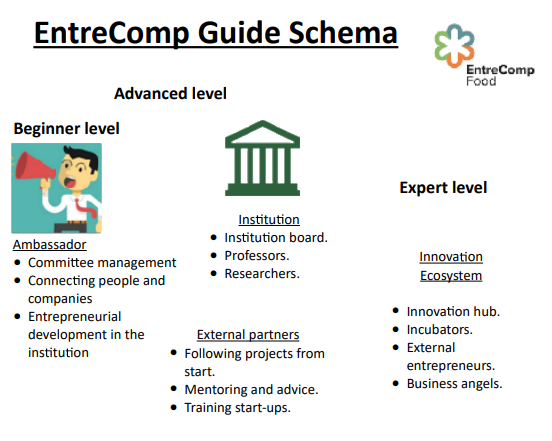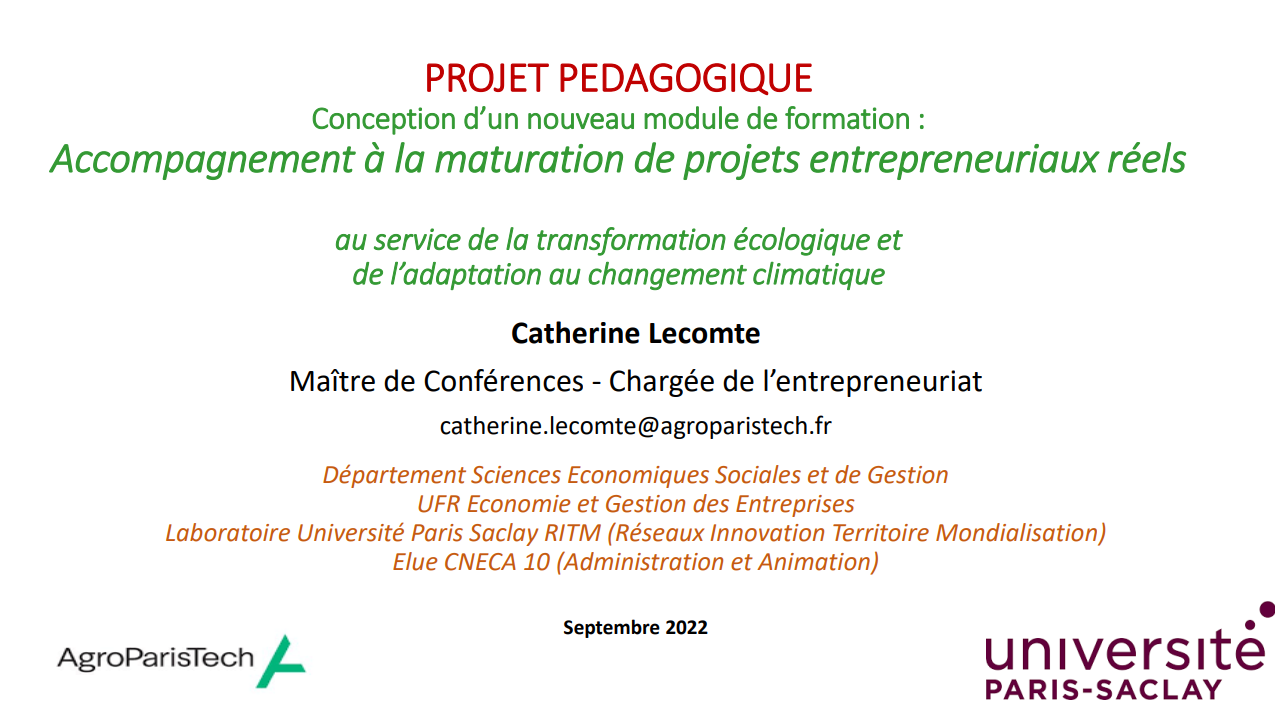Systemic support to implement Entrepreneurship Competences at University for Agri-Food
EntreComp project has as ambition to connect the world of education and work, by contributing to a better understanding and promotion of entrepreneurship competences in Europe. The EntreComp project aims to facilitate peer learning, teamwork and working through experience – practical work already during education.
The EntreCompFood guide has the aim to support the teaching of entrepreneurial competencies within the scope of EntreCompFood project in academic institutes, for students at different levels, and for young entrepreneurs that are supported by different types of institutions, including academics ones.
It has the objective to train the trainer, to assist professors on how to implement the teaching of entrepreneurial competencies in courses curriculum, but also to be a gathering of tools and strategies to implement entrepreneurial skills. It will also provide suggestions on how to help young entrepreneurs to have a global view of their business, to assist them in the development of lacking skills and to mentor students who want to become entrepreneurs.
This guide gives a list of tools that can help for the teaching of Entrepreneurial skills. It assembles concepts aimed to the establishment of the learning of these entrepreneurial skills in the curricula, the creation of entrepreneurial committees to support entrepreneurship in the academia, together with suggested tools that can provide the necessary education.
In addition, this guide also offers a model of self-assessment questionnaire to measure the development of entrepreneurial skills, which can be used by teachers and professors when mapping students’ level of competencies.

Assembling an entrepreneurial committee for high education institute.
For entrepreneurship to take place and flourish, the creation of an entrepreneurial committee in each institution is strongly suggested. This can be done by bringing professors, sponsors, researchers, employees, and representants together. It is essential that this committee has the support of the direction and the institution’s investors. This can be expressed in the different instances of the institutions, which should strongly support entrepreneurial projects as part of student's curricula. A strong communication on this dimension is essential to install and develop academic structures (courses; activities) that can be part of the education system and help the growth of entrepreneurial competences within students.
To ensure an efficient functioning of the committee, an ambassador (or responsible) should be officially assigned. Management and coordination should be secured by this person to develop entrepreneurship in the institution. Conception and constant amelioration of the dispositive accessible for students would be the responsibility of the committee and ambassador; new courses, internal entrepreneurial tournaments, mentoring, project management, building a food innovation ecosystem network and following entrepreneurial indicators through EntreComp reference tool would be among their designated obligations. The committee should follow and support the projects, connecting with experts and giving advice so the project can flourish.
The Institution’s sponsors should be involved in the development of the committee to provide funding and expertise (coaching, sponsorship, and external skills) to the food innovation hub and projects that could emerge. It is suggested the conception of an innovative hub where student’s projects could come to real life. The institution, together with professors, would support the development of projects guiding and incubating the start-ups.
Finally, the development of relationships amongst people involved in the establishment of innovation entrepreneurship with external actors of innovation forming an ecosystem where information about the subject, resources, member of juries, specialized speakers (for teaching), teammates with complementary skills (for development of project) is shared. The external contacts should be people involved in the entrepreneurship of other enterprises, economic development, industrial associations linked to food and bioeconomy, external incubators, business angels, and the EntreComp community.
AgroParisTech institution committee supports entrepreneurial development by having in place entrepreneurship tournaments, students support with projects and an incubator Food’InnLab where start-ups can test and characterize their product, connect with other start-ups and people in the field. Thus, being part of the university, it allows the exchange with professors and scientific. It is suggested that an ambassador for the committee should be named. The ambassador should be the go-to person when a student has an entrepreneurial idea.
Before testing EntreCompFood competencies, the University of Ljubljana, in Slovenia, had no existing entrepreneurial committee. When EntreCompFood competencies were tested, professors involved in the teaching gathered to discuss how they apply the EntreComp learning Pathway (Figure 1). For this reason and the exchange between them it can be said that a committee was naturally formed by the necessity of teaching entrepreneurial skills.
To inspire the development of entrepreneurial competencies in the institution a step by step is proposed.
- Form an entrepreneurial committee with an ambassador. Implement best practices to use project-base teaching.
- Mobilize institution board to participate and support entrepreneurial learning and teaching. For example, funding of entrepreneurial competitions.
- Offer courses and workshops for the maturation of entrepreneurial projects.
- Connect with external partners, other institutions, possible investors, and companies to promote entrepreneurial projects.
- Install an innovation hub where and incubator is present for the further development of projects and start-ups.

It is always nice to share your thoughts with likeminded people, for more peer to peer exchange connect to the EntreComp Community of educators implementing entrepreneurial competences as a secondary learning objective.